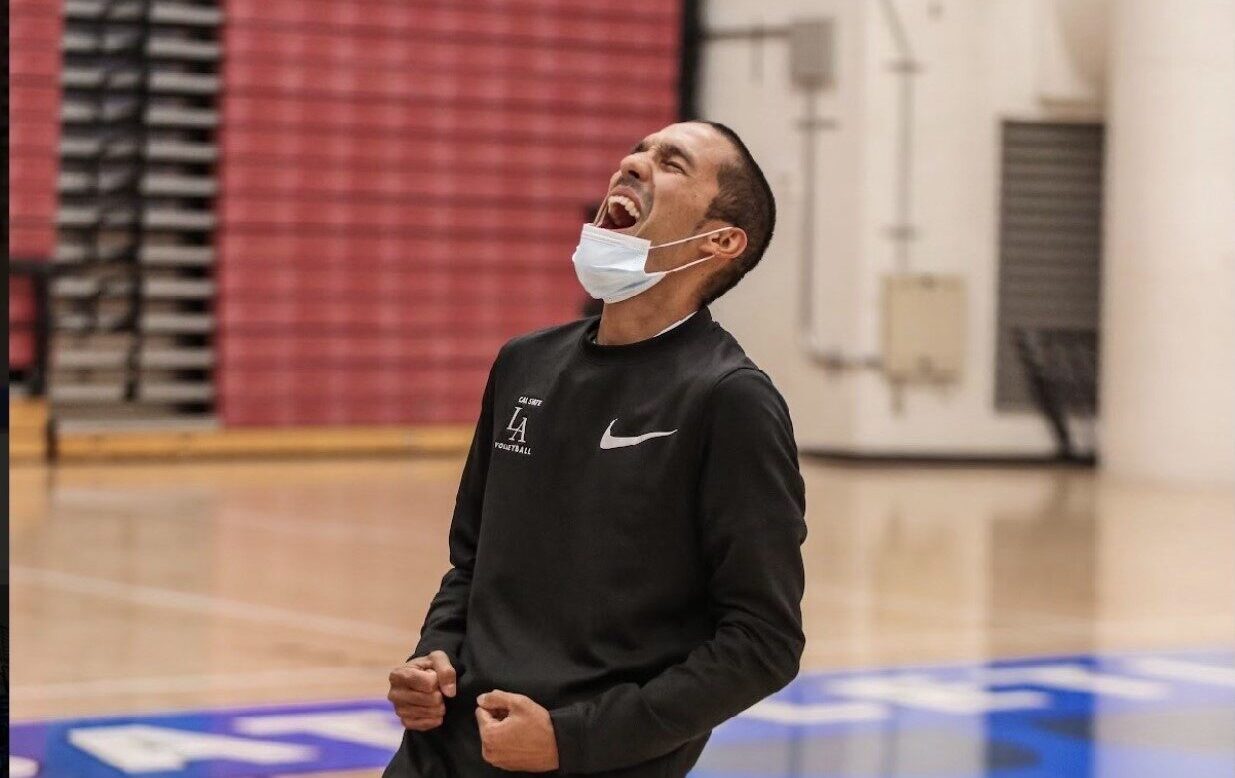
Volleyball:
By Brian Reed-Baiotto, Sports Editor
The fear of death is pretty universal.
But for Arcadia volleyball coach Stephen Bernabe, it became a ‘been there, done that’ mentality.
Nine years ago, Bernabe was entering the prime of his life.
He was 23, healthy, popular and a standout volleyball player.
Bernabe’s whole world looked to be irrevocably shattered, however, in the blink of an eye.
He was stretching with the aid of a roller under his back in the Cathedral High School gym.
Bernabe played volleyball and graduated from CHS in 2008, and would later serve as Mike Godoy’s assistant coach.
As Bernabe adjusted his body, the roller went underneath his legs and he fell backwards.
It caused the back of Bernabe’s head to hit the floor hard and it would cause a brain aneurysm.
Bernabe didn’t think anything was wrong at the time, so he left Los Angeles and was headed to La Salle High School to help run a practice for SMBC (Pasadena) with Tiare Tuitama.
On the drive from LA to Pasadena, Bernabe experienced a loss of feeling on his right side, and he was unable to grip the steering wheel or push the gas pedal or breaks.
As he got to within a half-mile or so from La Salle, Bernabe made sure he was close enough to the curb to park his car.
Thankfully, he made it safely and asked someone to get Coach Tui, so she could help Stephen stay awake long enough for his aunt (Audrey Flores) to arrive and take her nephew to Kaiser Hospital in Hollywood.
Bernabe described what he was enduring as, “my head felt like it was in a vice grip and that I had a heartbeat on the top of my head.”
Audrey got Stephen to the hospital around 6 p.m. and less than 12 hours later, he got the life-shattering suggestion to start calling those closest to him and say his final goodbyes.
He made three calls, but because it was so early in the morning, people were sleeping.
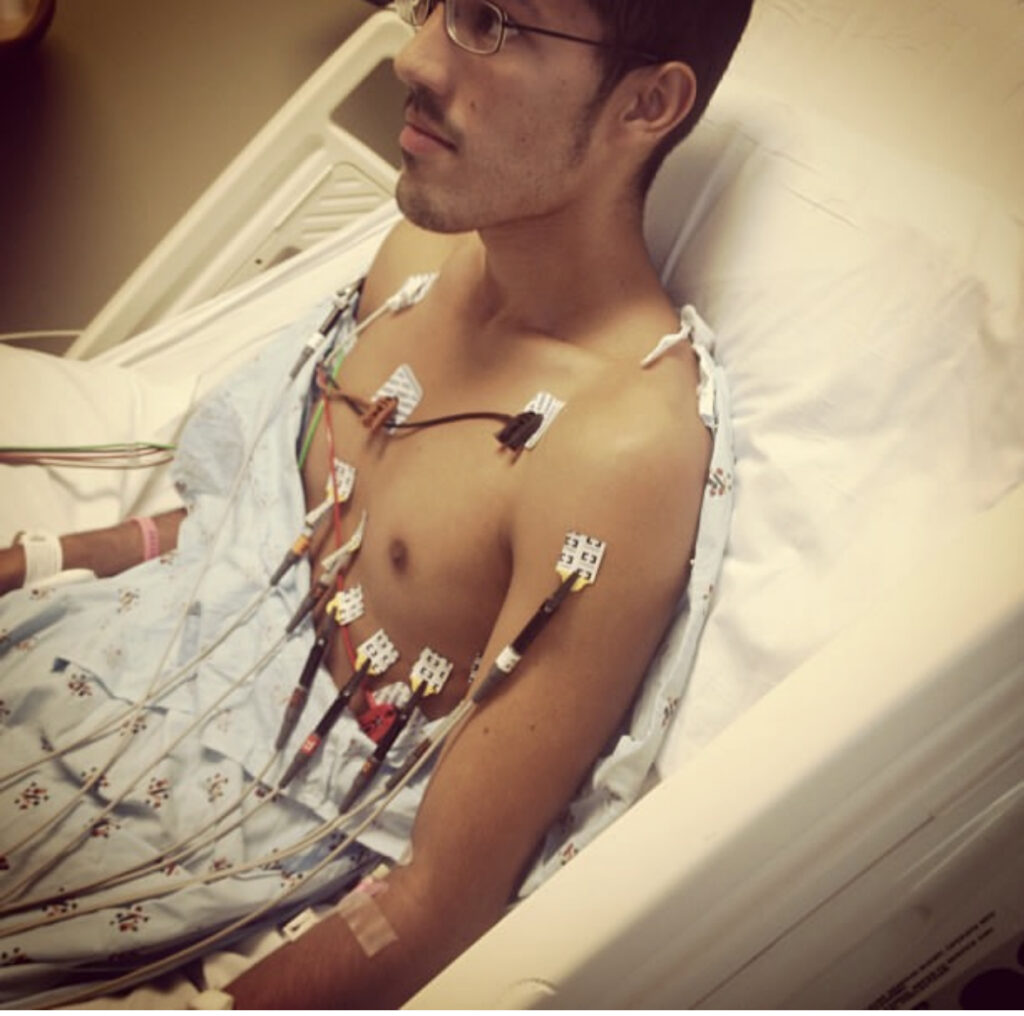
Bernabe said he was relieved, because he didn’t want to articulate the words, let alone accept the diagnosis that he was going to die.
Fast forward an hour or so, and Bernabe would undergo a cerebral angiogram, so that doctors could tell which veins in his head were malformed.
On top of all the uncertainty and fear of losing his life, Bernabe was burdened with the task of not being allowed to sleep more than 15 minutes at a time so that his brain activity would remain normal.
All went pretty well, but the doctors wanted to keep Bernabe hospitalized for three more months before undertaking a procedure that would either save or end his life.
Being the stubborn guy that he is, after 10 days at Kaiser, Stephen told his caretaker’s that he wanted to go home, despite their insistence that he’d be much safer with them.
Bernabe would not relent, so they had him sign pages and pages of paper work confirming that it was his decision to go against their recommendations.
In an interview several weeks ago, Bernabe said, “if I was going to die, I wanted it to happen in the comfort of our home and around my mom, sister and grandma,” he said.
The same precautions had to be taken over those three months at home so that he’d survive long enough to hope for a medical miracle.
And that meant family and friends would come by at all hours to not only talk and keep his mind occupied with positive thoughts, it was just as much to temporarily escape the nightmare he was living and the very real chance that he wouldn’t reach the age of 24.
Bernabe mentioned that shared meals have always been something he’s treasured in good times and bad, and how much it meant for his friends to bring him food and shoot the breeze like everything was normal.
That gets us to his arterial embolization, so they could gauge how much blood his brain was leaking and how swollen it might be.
They warned Bernabe that he would suffer horrendous headaches, but what they didn’t tell him or anticipate was that Stephen would become paralyzed and that his vision would rapidly deteriorate.
He described that time as ‘terrifying.’
Six days later, his mom, Frances Bernabe, noticed his toes were moving, and she excitedly told her only son that it was a great sign and that there was real hope to cling to.
But the hardest and most dangerous procedure was nearing and Bernabe had to make a decision that no one could be prepared to make, and certainly not an athletic and fit guy in his early 20’s.
His options were to spend the next year in the hospital and endure chemotherapy on a daily basis to zap the veins.
If that didn’t sound bad enough, the second choice seemed far worse.
His doctors would cut Bernabe open from the back of his skull to the back of his ears in a procedure that would take 12 hours to complete.
Additionally, they gave him a 50-50 chance of survival, and that even if he did pull through, there was a better chance than not that Stephen would live in a vegetative state.
It also included the reality that he might need to spend up to a year in a medically induced coma.
Not surprising to those who know this skinny little badass, Bernabe chose the latter.
Stephen talked about the journey to the operating room in which his mom walked as far as they would let her.
With both fear and love in his heart, Bernabe told himself he needed to be strong and put on a brave face for his mom.
He wanted to give her hope and didn’t want his mom to know how frightened he really was.
So just before entering the cold room, he glanced back, gave her a thumbs up, smiled and said, “I’ve got this mom.”
And as it turned out, he was right.
But what happened next shocked even his doctors.
Shortly after the procedure was done, Bernabe woke up and could hear the noise of the doctors and medical staff putting their tools away and asked, “how did everything go?”
A couple of people were so surprised to hear his voice, let alone the clarity in it, that they dropped their tools.
Four days later, Bernabe would leave the hospital and head home, but his recovery required a massive amount of time, patience and diligence.
As he was on the mend, Bernabe would need help standing and walking at times, and it became frustrating for a kid that had always been so athletic and agile.
Bernabe needed inspiration to get him over the finish line, and nothing outside of family and friends has meant more to Stephen than the sport of volleyball.
And as mentioned, he was a member of Mike Godoy’s staff at Cathedral High.
Bernabe would attend their playoff games, but he wasn’t well enough to sit on the team bench next to Godoy, his staff and the Phantoms’ players.
Bernabe asked Godoy if he could address the team before their semifinal round match.
Stephen took the time and explained his condition, and spoke about how much he loved the school, the program, volleyball and all of them.
Through buckets of tears from everyone in that room, he made them promise that even if he lost his battle, that they would continue to fight and use his memory as a force for good and not as a source of devastation.
Two matches later, Cathedral won their first volleyball championship in school history.
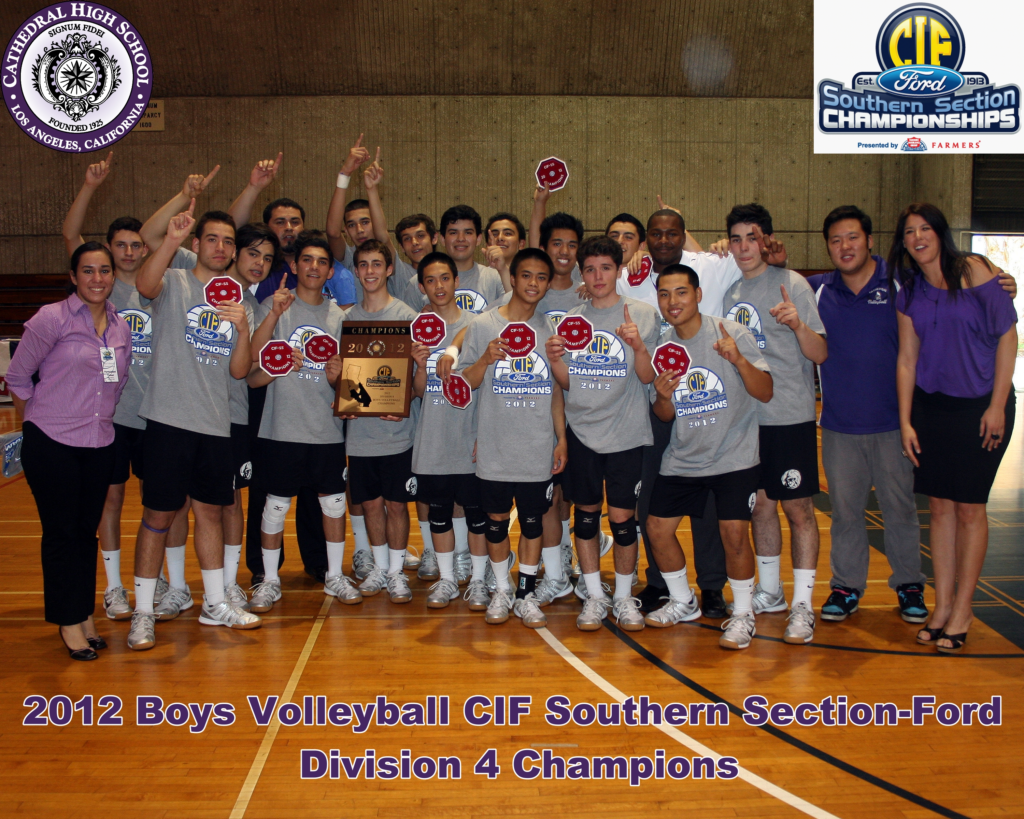
And they would go on to win two more titles.
In all, Bernabe has been part of four CIF-SS championships as a coach, three at his alma mater and one at Salesian.
I asked Coach Godoy via email to answer a few questions to use in this story, and he ended his quote with a picture of the championship team.
But it wasn’t the photo that gave me chills, it was what he said.
“Stephen is not pictured physically,” Godoy said. “But he is there. Just look into their eyes, and you will see Stephen.”
Bernabe told his mom that if he did survive, he wanted his family to take a trip to Puerto Rico.
And Fraces kept her end of the agreement.
They went to Puerto Rico over Christmas and were joined by his sister, Melissa, and their grandmother, Aurelia.
Aurelia, 89, is Stephen’s hero and someone he calls the rock of the family.
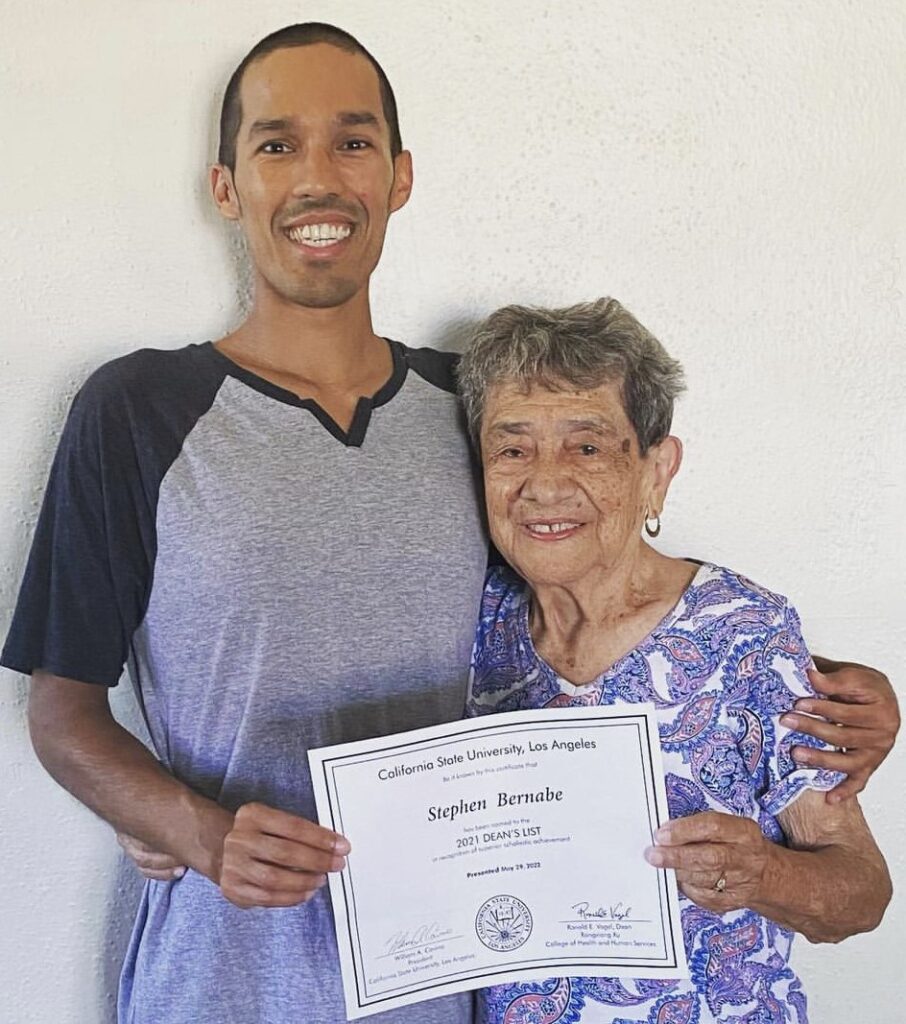
I’ve tried for a couple of years to convince Bernabe that his story could serve as an inspiration, and in July of 2022, he was finally prepared to bare his soul.
He doesn’t seek sympathy or a pat on the back, Stephen just wants people to know that even in the darkest times, there are shimmers of light if you look hard enough.
It will sound cliche, but he knows better than almost anyone how easy it is to take life and those around us for granted.
Bernabe said that through this nightmare, he wants others to learn what it took him two near-death episodes to accept.
And that’s to not fear failure or back down from what one might see as insurmountable odds.
At one time in his life, Bernabe didn’t always take his education as seriously as he would have liked, but in a few months, Stephen will have earned his Bachelor’s Degree from Cal State LA, and he plans to immediately focus on getting his Master’s.
Bernabe has served as an assistant and head coach at many stops along the way, and is always looking for a new challenge.
But in 2022, for the first time, he feels like he’s found a home at Arcadia High School, where he leads the boys and girls programs.
Bernabe said he wants to create a legacy at Arcadia that both programs are considered perennial powers within the SGV and southern section.
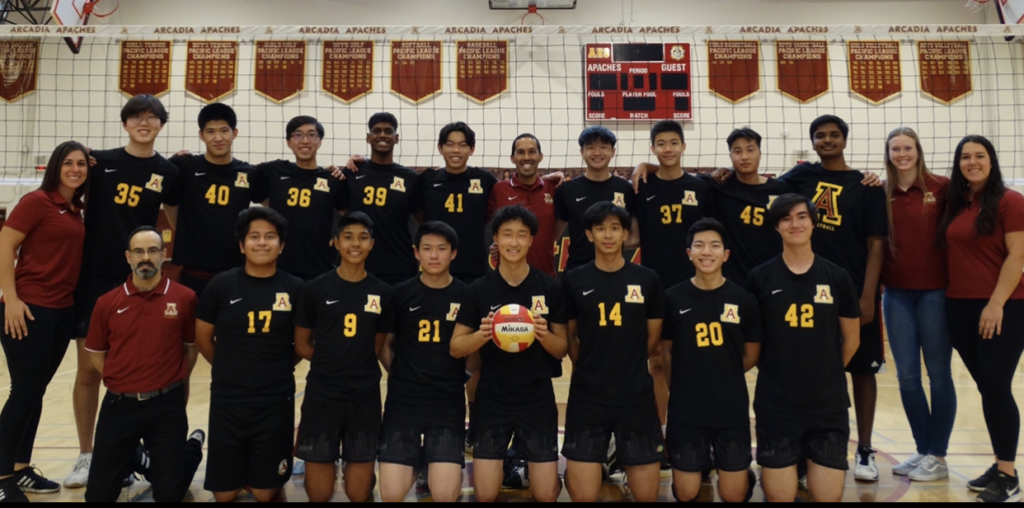
Another side effect of knocking death on its ass is not accepting mediocrity, whining, excuses or laziness.
So Bernabe can get heated with his athletes, and from time to time, he might use some colorful language, but it’s not gratuitous.
It’s his way of toughening up the student-athletes, challenging them to take their game to the next level, and most importantly, preparing them for a cold and often times cruel world that faces all of us once our athletic days have come and gone.
Lastly, I asked Stephen to touch on what he’s learned and/or how life has changed.
Said Stephen Bernabe: “It really taught me that we’re not invincible, even when you’re as young as I was at the time. It’s helped me enjoy the little things that I used to take for granted. I can remember one time waking up to birds chirping outside of my bedroom window and I started crying, because I found it to be beautiful. I also don’t waste time sweating the small stuff. I focus on what really matters. And the love I have in my heart for my family and friends is so intense, because you find out who really cares about you when you’re facing the challenges I was going through. I really hope my story can help inspire people to fight, even when the odds aren’t in your favor. And finally, I want people to chase their dreams and don’t fear failing. We all fail. It’s what you do after falling short that defines you.”
To view a photo gallery of Stephen’s journey, click on the Facebook link here: Facebook
Directly below are quotes from Stephen’s peers, friends, one of his former athletes and his mom describes the trials and tribulations that her son and family have endured.
Quotable:
Cathedral coach & Dean of Students, Mike Godoy: “When Stephen played for me, he undoubtedly had the passion and fire for volleyball, which are the key ingredients to be a coach of any sport. What I loved most about Stephen was his ability not to stray away from adversity or give up on himself and his teammates when the match was not going well for us. It fired him up more. Those same traits I have seen in Stephen as a coach. And even better, those traits are contagious, so his teams reflect his passion and competitiveness in the sport. Stephen has had his valleys and hills since high school. I knew he had the willpower to get through his head trauma. Stephen was not going to leave this world in that manner. I remember him telling me to keep the boys focused on our season and that he will be coaching them from a distance. Volleyball was his lifeline. Our success on the court motivated him to fight and get through his setback. I just remember thinking to myself how strong Stephen was mentally (but it didn’t surprise me). The year of his head trauma, we won our first CIF title in school history. Stephen has mentioned to me how much that helped him to fight and live. Weeks after major brain surgery, he would attend our volleyball matches and watch from an athletic office with a window that had a view of the court. Weeks!
The kids would see that, and it pumped them up! “For Stephen!” would be the chant the kids would use in the huddle. And it automatically triggered the same fight and passion Stephen had. So often, during the match, I would turn to look at Stephen watching through the window, and I could always see him motioning, cheering, and smiling; there I was thinking, “Oh my God, please don’t collapse” or anything like that. Again, he was weeks out of major brain surgery, and there he is, with the same energy and passion on the sideline. Amazing! All of the success he has achieved on and off the court is well deserved, and more to come. Stephen’s academics in high school were not the strongest, and here he is today, with a bachelor’s degree (and I think he said he wants to pursue his master’s degree). I am most proud of that accomplishment (well, besides him surviving his brain trauma). On top of that, to see Stephen grow into a volleyball coach where he develops his talent brings such great joy that the volleyball world still has coaches that truly coach for the right reasons. Here is a picture of our CIF championship team. Stephen is not pictured physically, but he is there. Just look into their eyes, and you will see Stephen.”
South Hills girls & La Salle boys coach, Tiare Tuitama: “We had practice at La Salle that day for club volleyball, and as we were setting up, someone came and got me and said coach Stephen needs you upstairs. He was sitting in the car with the seat back. He spoke in a very soft voice in his eyes were squinting and that times were rolling back. He had told us that he had just come from the Cathedral practice and he hit his head while diving for a ball. he said he couldn’t see straight and felt nauseous so we thought it might have been a concussion. We called his family and stayed with him until they came and got him, because there no way he could drive home. Everyone that practice was wondering if he was OK. It wasn’t until the very next day that we found out how severe his head was, and the thought of what could of happened if we let him drive home that day. I am glad that he is alive and well and pursuing what he loves. He has been a big asset to all the programs he’s coached at, including mine, and I couldn’t be happier that he’s able to share his passion for volleyball and life with his athletes.”
2022 AHS grad, Ashley Marrone: “I’ve known Coach Stephen since I was 15 years old. In the years I’ve been with him, he has taught me a lot about mental strength, discipline, and responsibility. His ways of coaching have not only helped me progress in volleyball, but also in life with academics and anything that requires a level of resilience. I respect his coaching style and his drive for success. He will be one of the best coaches I’ve had in my years of volleyball and I give him credit for making me into the player I am today.”
FSHA coach, Trent Tcheng: “I’ve known Stephen for awhile now. He has a thirst to learn and get better. He has coached with a renewed energy and excitement for as long as I can remember. His passion for the game and to grow the game can be seen when he talks about volleyball with players, parents and other coaches. He always the first person to say hi and ask how you are doing. It’s hard not to feed off his energy when you are around him. His story is crazy and just knowing what he has had to overcome is amazing.”
Arcadia High School athletic director, Milica Protic: “The greatness that the team has achieved is because of his leadership. It’s work ethic, strategy, pure enthusiasm, level-headedness and respect that has been earned. He is genuinely one of the most amazing human beings I know and I am grateful he is here to mold the young youth.”
Long Beach Wilson coach, Chris Ceballos: “I’ve played and coached volleyball with Stephen from a young age. Stephen is my little brother. I’ve watched him grow up through our club years and then we played a year together at El Camino College. We hung out a lot and during those years we were both just trying to figure out our paths. We were broke college students just trying to chip away at school and play the sport we loved. Stephen was always the ultimate hype man and he still is. His outlook on life has always been one of positivity and opportunity, he has a “can-do” attitude. His accomplishments on and off the court no matter how big or how small were appreciated and celebrated by him and his supportive family and friends. It was tough for me to see him in that state, even for as close as we were, I didn’t fully understand what was going on and the severity of the matter. I just remember seeing him weak and attached to a crazy amount of tubes and machines in the hospital. Stephen was always in great shape but to see the toll it took on in his body was scary. While the process was scary and looked bleak at times, for some reason I knew he would make it because he just wasn’t done accomplishing the goals he set upon his life.
After all was said and done, Stephen pulled through, but we knew the recovery process would be another tough journey ahead. He came out of it like a champ. I invited him out to a few workouts with me and he had everyone almost in tears with his story. He began to put weight back on and build muscle again, and it was a sight to see, because he bounced back so quickly. I know when we were in college, he was the positive guy in the room, but even he worried about our futures and how we could get to where we wanted to be. After his brain surgery, his positivity was taken to a whole new level. He loosened up a bit, maybe grew more patient with the process and just began to slowly chip away at his life goals. Now look at him, he’s one of the top coaches in the area, he’s graduating with a degree, he’s teaching, he’s got the lady of his dreams. I’m just so proud of the guy and how he’s methodically attacked his goals and followed through. When trying to motivate and coach his athletes, he has something to pull from that some coaches never experienced. Watch him go through it all has made me a better coach, a better parent and just a better person in general. If you ever need an amazing friend when times get tough, get yourself a Stephen Bernabe.”
Former South Torrance coach, Ken Hamamoto: “I met Stephen at El Camino College playing for the men’s volleyball team. I want to say this is around 2008. We were both from out of the area (I was coming from Hawaii and Stephen played outside of the South Bay). Although I am older than Stephen by a couple years, he knew the area and took me under his wing. I consider myself more reserved, but something about Stephen told me that I could trust him from day one. After our El Camino days, we kept in touch through the volleyball coaching circuit and met up randomly for lunch. Aside from volleyball, he’s definitely up there on my contact list of guys I feel comfortable calling about anything. I actually did not find out about his situation till he was feeling much better. That’s the thing about Stephen, regardless of if it’s positive or negative news, he doesn’t make a big deal of things. For someone from his generation of social media, unless you really sit down with him, you would never know that he has a tight knit family where he takes care of people, the multiple CIF championship rings that make him look like Phil Jackson, or the near-death experiences he faced. The first text I remember getting from Stephen during his recovery was “How’s everything going?” There was no mention of anything about being in the hospital, which is who he is. I only recently learned that he went through a dark period of time with depression and just contemplating things about life.
We spoke about the things he would think about and his mindset has changed. Stephen is a very positive person, but admits that he now slows life down and appreciates life events. To this day, while he does a better job stopping to enjoy life, you would have never known that he went through a traumatic experience unless you asked about his story. Why I think he made it out the otherside: After hearing about the dark times he had at the hospital, I feel like he made a choice for himself to battle and make a comeback. Had he decided that he didn’t have anything to live for, I may not be writing this email. While Stephen has a strong supporting cast around him, I believe he came fought back to not let his loved one’s down. I don’t think he had it in him to “choose” to go before his grandmother or mom. I think he thought about all the kids he not only coached but made strong lifetime friends with. And that’s Stephen, he’s always giving way more than he receives, whether he’s paying for someone’s meal or living longer to not let others down.”
Stephen’s mom, Frances Bernabe: “Having my son, a young man otherwise in perfect health with a massive brain hemorrage at 23 was lifechanging for our entire family. I will never forget (5/6/2013) getting a call that he was in transport to Kaiser. When I arrived, they immediately took him in & took the tests that confirmed the brain hemorrage (stroke). Within a few hours, his sight was impaired, his right side of his body was paralzed & his speech became slurred. He was placed in the ICU & his condition was grave! Due to the seriousness of his condition, he was allowed two visitors a time for 24 hours a day. As word spread through both our immediate family & his volleyball family, people began showing up at the hospital. Two by two around the clock for several days they came. Family members, friends, his high school, club & college coaches, parents & his volleyball students (from all levels) showed up to offer well wishes. He was stabilized enough to go home after several days of medical care. He was given all of the options for his future care & the decision was made to begin the preparations for a craniotomy (open brain surgery). He was given strict orders to remain calm, confined to his home & avoid any possible accident or motion to the brain in order to assure maximum blood absorption needed pre surgery. For three months, he followed all of the doctors orders with the exception of his one request, which was to attend the CIF championship (semifinal & championship games). Dr. Pikul (neurosurgeon) allowed him to attend with strict specifications regarding seating, location & limited time out.
The Cathedral High volleyball team dedicated every game to him & his presence was received with tears & optimism for his full recovery and a school win! There were multiple times through this experience we were afraid we might lose him. When he had the stroke, we were afraid he might not recover. As he pushed himself to leave the house to go attend the games, I often worried that he might stumble & potentially burst the AVM. And lastly, when it came time for the embolization procedure, & the following day the craniotomy, I knew his life was threatened by both procedures. Those 24 hours were the most critical & dangerous of times. We were shrouded in faith & love from both the immediate family & his volleyball family as well. Several of our friends & family churches decided to start prayer lines & one of his students contacted me to ask the exact time of his surgery. Her father is a minister & he was able to provide members of his ministry that would unite in prayer for the entire 12-hour surgery. As Stephen was being taken to the surgery, the last thing I said to him was ‘fight to live through this surgery & God will take care of the rest.’ He leaned over & said “there’s a reason I have survived all of this so far so I know I can make it. I was holding back tears & then he said, “once I get through this, I want to take a family vacation to Puerto Rico.” Once the surgery was over, the surgeons came out & said he was in exceptional spirits. His first words to me were, “I made it, now you start planning the trip!” We were surprised to hear that the surgery had been a full success and better than expected & that he was experiencing a miraculous expedited recovery.
All of the “expected” outcomes were not relevant to his response. They did not have to induce the standard coma after the craniotomy, he didn’t need to remain in the hospital for a lengthy period nor did he require any usual & customary physical therapy. He was able to walk through the ICU just four days after the brain surgery. The ICU nurses were in awe of his determination to push through & in tears when they saw him walking in the ICU hallway. He smiled & told them all, “I told you I was going to survive & walk again!” His love of life, family, friends and volleyball gave him the strength to persevere even through the worst of times. He always tells his story to help encourage others that they should never give up.”